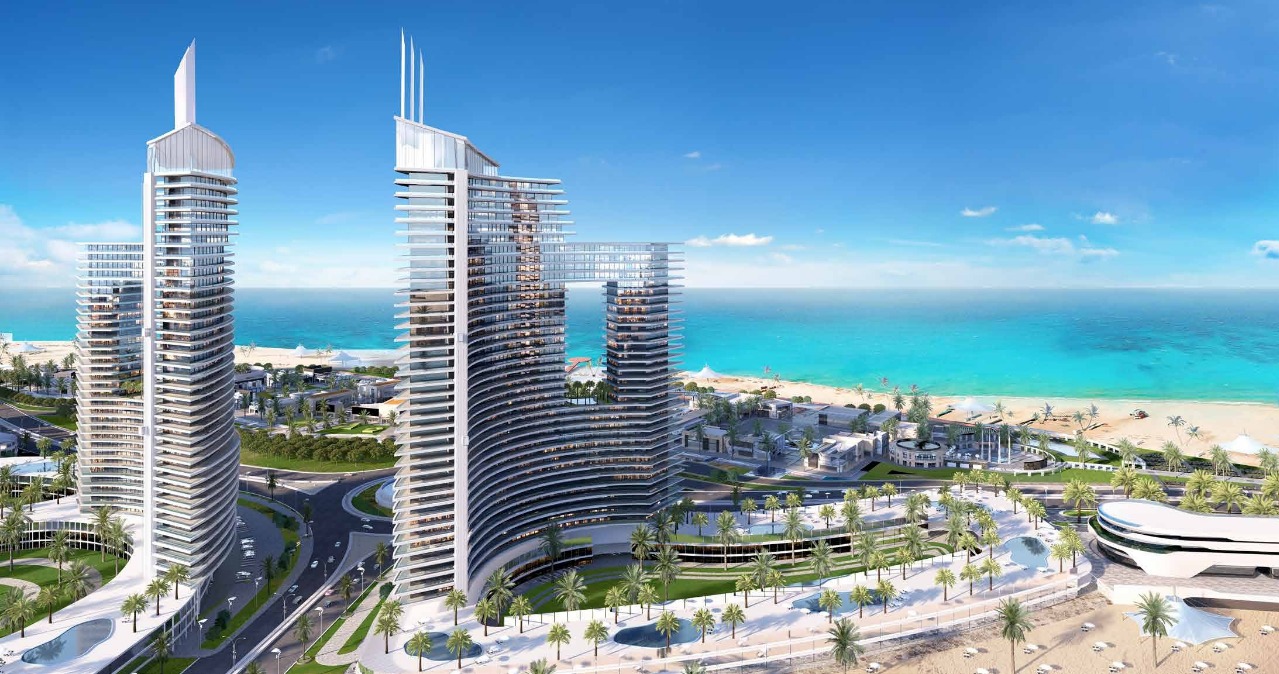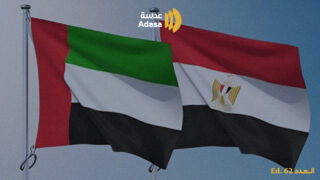On February 1, news from unidentified sources surfaced claiming the Cairo city government's purported plans to relocate the inhabitants of Ras El-Hekma, situated on the Mediterranean coast northwest of Cairo[1], as a precursor to its sale to a consortium of UAE investors. This development triggered widespread public uproar, with many Egyptians drawing parallels to the controversial transfer of the islands of Tiran and Sanafir to Saudi Arabia in 2017, despite a legal verdict affirming Egyptian sovereignty over the islands.Top of Form
Scene one
On February 4th, the residents of the El-Jameel Suburb in the Port Said Governorate, one of the three governorates adjacent to the Suez Canal (alongside Ismailia and Suez), voiced their angry pleas following the arrival of the authorities’ bulldozers, which commenced the demolition of their residences in preparation for their relocation and the subsequent clearance of the entire suburb to put it out for investment.
Scene two
On February 8th, reports began circulating regarding the Egyptian authorities’ contemplation of the potential sale of the Ras Jameel area, located near Sharm El-Sheikh’s international airport. This area represents the final stretch facing the islands of Tiran and Sanafir. However, specific details about the proposed transaction were not disclosed.
***
Since ancient times, agricultural lands have traditionally been the property of the authority. Ancient Egyptian literature provides ample evidence that the land of Egypt was bestowed by divine providence upon the king (Pharaoh), who exercised control over it at his discretion. Over the centuries, rulers have exercised this authority, employing it to restructure society, manage social dynamics, and navigate significant economic challenges. Presently, this prerogative has been assumed by El-Sissi, who appears to perceive himself as a direct heir to the ancient Egyptian monarchs. This perception is manifested in his advocacy for a revival of Pharaonic symbolism. In 2018, he took the decision to establish The Sovereign Fund of Egypt (TSFE), akin to a bottomless reservoir housing Egypt's assets earmarked for potential divestment or investment. TSFE articulates its mission on its official website, stating: “TSFE like an ancient Egyptian temple, representing the country’s center of power where all its most valuable treasures are placed, forged its economic pillars to represent the sectors of economy on which Egypt prospers.”
The city of Ras El-Hekma is situated on the Mediterranean coast, halfway to the Egyptian nuclear city of Dabaa in Matrouh Governorate. Taking over the peninsula marks a significant evolution in the authorities’ approach, which typically involves expropriating properties within limited neighborhoods. However, on this occasion, the decision was made to seize an entire city. So, what is the story behind the city, and how was it acquired?
The government has refrained from imposing restrictions on areas bordering Libya, such as Ras El-Hekma and New Alamein, and has not constrained sales transactions. This leniency in sales operations raises concerns about potential threats to Egypt's national security, with analysts speculating on the possibility of the UAE transferring its shares in Egyptian assets to the Israeli occupation authority. This speculation follows the comprehensive normalization of relations between Israel and the UAE since 2020.
The preceding three intersections direct our attention to the current Egyptian authority, which now holds jurisdiction over all lands within its borders, regardless of ownership by private or public entities/individuals. Utilizing its most potent and effective instrument, the Public Interest Law[2], the authority can acquire property that has historically been owned by citizens, purportedly for integration into a national project or in anticipation of inclusion in one of the investment funds associated with the sovereign fund.
Among the properties recently taken over by the authorities was the city of Ras El-Hekma in Matrouh Governorate, situated on the northern coast of Egypt. This action marks a significant evolution in the authority's approach, which typically involves expropriating properties within limited neighborhoods. However, on this occasion, the decision was made to seize an entire city. So, what is the story behind the city, and how was it acquired?
Cairo sheds its peninsula
After conducting telephone interviews with various tribesmen in Ras El-Hekma, we have found that the individuals involved in the incident have denied their consent to transfer ownership of their city to either a domestic or foreign investor. However, a key point of contention arises from some non-indigenous people who own acres of land and are willing to make concessions in exchange for lucrative compensation, whether in kind or material form. Despite these conflicting perspectives, the governing authority has made the unilateral decision to expropriate all properties at a significantly reduced rate, not exceeding 150,000 EGP (about $4,853) per acre, with no provision for compensation for residential structures. This decision stands in stark contrast to the actual market value of the land, which is estimated to be more than 1 million EGP (about $32,362) per acre.
The indigenous population, residing under tribal customs and traditions, is estimated to exceed 25,000 individuals based on their accounts (as no official census is available, due to the government's intent to obscure the actual population figures in certain border regions and among religious and ethnic minorities). They reported that governmental authorities and real estate corporations dispatched bulldozers to their community on February 19th, initiating the demolition of several residences. Despite this, they have unequivocally stated their refusal to undergo forced relocation. They are actively pursuing negotiations, per the resolution reached by the Tribal Council during their assembly on February 11th, which culminated in a brief altercation with a limited police force.
Members of the Zaghiri tribe, known as one of the largest tribes of that region, have reported some cases of forcible displacement dating back to 2015. This displacement followed directives to vacate the area between the King Farouk Rest House and the Presidency Resort, impacting about 40 families within their community. Subsequently, government authorities seized hundreds of acres from the tribe, providing minimal compensation in return. Supporting urban development initiatives, residents agreed to the relocation plan and settled in a nearby area. There, they built new homes and reclaimed additional land for agriculture using the compensation they received. However, recent events unfolded when the current Minister of Transport and Communications and former head of the Armed Forces Engineering Authority, often referred to as “El-Sissi's broker” by residents, visited the community earlier this month. The purpose of the visit was to renegotiate the expropriation of their current properties for city development projects, this time without any compensation. The reason given was that the residents had already been compensated in 2015. Residents noticed an Emirati aircraft near the Presidential Palace along the shoreline, from which an Emirati investor and the head of Emaar Properties got off. According to the citizens, this individual is reportedly finalizing the deal as a representative of the Abu Dhabi government in partnership with Cairo.
The Sovereign Fund of Egypt articulates its mission on its official website, stating: “TSFE like an ancient Egyptian temple, representing the country’s center of power where all its most valuable treasures are placed, forged its economic pillars to represent the sectors of economy on which Egypt prospers.”
In 2018, Egypt's formal agreement with the United Nations Human Settlements Programme, UN-Habitat, was announced, initiating the Ras El-Hekma project. This initiative aligns with the principles outlined in the New Urban Agenda, the Sustainable Development Goals, and Egypt Vision 2030. As per information on the UN-Habitat website, a consortium of international entities, comprising a British firm and an Egyptian company, has been selected as partners by the organization and the Egyptian government to strategize the development of the new city and multiple fourth-generation smart cities. The process involved relocating residents in Cairo from an approximately 2-kilometer coastal strip extending 25 kilometers inland, with the state seizing properties from around 3,000 families. According to their testimonies, many affected individuals have not yet received adequate compensation for their displacement.
In 2024, unidentified leaks brought to light Egypt's transaction involving the sale of Ras El-Hekma City to Emirati investors for $22 billion. This development occurred concurrently with the presence of IMF delegates in Cairo for negotiations on a prospective new loan that the Egyptian government aspires to elevate from $3 billion to approximately $10 billion. Furthermore, individuals with insider sources related to the Egyptian government assert that the Ras El-Hekma deal is poised to be executed for a total value of $42 billion spread across a seven-year period. This positions Cairo to pay off a significant portion of the forthcoming external debt and associated interest payments in the years ahead. Cairo is set to pay off $32.8 billion this year, representing approximately 20% of the total external debt obligations, which stand at around $164.7 billion according to Central Bank figures from the end of the previous year. The tribal leaders have reported that earnest discussions with the authorities have commenced in earnest concerning the execution of the second phase of the city's evacuation, spanning 2 kilometers along the coastline and extending 40 kilometers inland.
In early February 2023, the government disclosed its plan to sell shares in 32 state-owned enterprises by March 2024, as outlined in the state ownership document sanctioned by El-Sissi in December 2022. The objective is to reduce state involvement in 65% of the Egyptian economy by engaging strategic or local partners.
The limited availability of official information regarding Cairo's transactions continues to raise the concerns of the Egyptian populace. Every now and then, Egyptians are caught off guard by the sudden disclosure of asset sales or the liquidation of significant and lucrative economic establishments. Their frustration mounts as they feel powerless to safeguard their properties and land or cope with the escalating costs and economic strains stemming from governmental strategies.
Simultaneously, reports from local government newspapers have indicated that Cairo is engaged in discussions with various international corporations and investment funds concerning an urban development agreement for the city. However, the specifics of these dialogues have not been disclosed, and there has been no official confirmation or denial regarding the potential sale. These actions suggest that an official announcement regarding the agreement is forthcoming. Subsequently, the CEO of the General Authority for Investment and Free Zones (GAFI), Hossam Heiba, officially confirmed the aforementioned agreement, noting that the government had received proposals from multiple international investment consortia for the Ras El-Hekma project on the North Coast. Among these proposals, an Emirati consortium has been selected to spearhead the project, taking on responsibilities for financing, development, and management. Negotiations have been successfully concluded, and the parties are presently at the stage of finalizing the contractual agreements. Additional sources have indicated that the Emirati consortium is slated to acquire an 80% stake in the city, leaving the remaining 20%[3] under the ownership of Egyptian entities, including both investors and governmental bodies.
Pre-emptive measures
The government in Cairo has implemented a series of proactive measures to facilitate the process of divesting its assets and state-owned lands. In early January of this year, 2024, the Parliament endorsed the government's proposal to amend certain provisions of Law No. 143 of 1981 concerning desert lands. The objective of the amendment is to enable foreign investors to acquire the necessary lands for their operations or expansions without being bound by the stipulations outlined in Articles 11 and 12 of the Desert Lands Law. These articles mandate that Egyptian ownership must constitute a minimum of 51% of a company's capital, with individual ownership not exceeding 30% of the capital, and exclusively reserved for Egyptian nationals. Furthermore, previous revisions in 2023 to Law No. 230 of 1996 now permit foreign nationals to acquire limitless real estate, as opposed to the previous restriction to only two estates in two distinct cities. As highlighted by the Center for Alternative Policy Solutions, an esteemed research institution associated with the American University in Cairo, these legislative changes signify the government's exhaustive efforts to rectify the repercussions of its actions under the guise of the economic reform program since 2016. The government has commenced the sale of its assets in foreign currency to address its debt obligations and advance its ongoing projects, despite the unprecedented escalation of external debt in Egypt's history. Notably, the government has refrained from imposing restrictions on areas bordering Libya, such as Ras El-Hekma and New Alamein, and has not constrained sales transactions. This leniency in sales operations raises concerns about potential threats to Egypt's national security, with analysts speculating on the possibility of the UAE transferring its shares in Egyptian assets to the Israeli occupation authority. This speculation follows the comprehensive normalization of relations between Israel and the UAE since 2020.
Why the UAE?
In early February 2023, the government disclosed its plan to sell shares in 32 state-owned enterprises by March 2024, as outlined in the state ownership document sanctioned by El-Sissi in December 2022. The objective is to reduce state involvement in 65% of the Egyptian economy by engaging strategic or local partners. This initiative has prompted inquiries into whether the prevailing economic challenges in Cairo are presenting an opportune moment for the government to execute a predetermined agenda aimed at kick-starting economic transformation. Particularly noteworthy is the transition observed in the support from Gulf governments, notably the Abu Dhabi administration, which has evolved from unconditional aid to the current regime towards a focus on investments. It is crucial to acknowledge that the influx of Gulf funds into the Central Bank of Egypt significantly bolstered foreign currency reserves and contributed to the stabilization of the local currency's value during the period spanning from 2013 to 2014[4].
Gulf governments, including the Abu Dhabi government, have shifted from granting unconditional aid to the current regime towards a focus on investments. It is crucial to acknowledge that the influx of Gulf funds into the Central Bank of Egypt significantly bolstered foreign currency reserves and contributed to the stabilization of the local currency's value during the period spanning from 2013 to 2014.
Concerns have been raised by some Egyptians regarding the possibility of the UAE serving as an intermediary for Israeli interests to acquire assets in Egypt, potentially through the granting of citizenship to Israelis, especially since international media has reported in 2021 that the Abu Dhabi government had conferred Emirati citizenship upon approximately 5,000 Israelis under the guise of investment, enabling them to freely traverse Arab countries, including Egypt, under their Arab Gulf nationality.
It seems Abu Dhabi's strategic intentions regarding acquiring Egyptian assets in exchange for support to the regime since 2013 were premeditated, with a calculated utilization of tactics to align with its overarching agenda. Notably, Gulf nations, spearheaded by the UAE, actively advocated during the 2022 IMF review sessions to impede Cairo's access to a substantial loan ranging from $9-12 billion. Consequently, an initial consensus was reached between the involved parties for a reduced loan amounting to $3 billion, leaving Cairo primarily reliant on the Gulf region's financial inflows. However, the dynamics shifted following the commencement of the Egyptian authorities' divestment of public asset shares to the Emirates, prompting discussions during the recent visit by fund officials regarding the potential augmentation of the loan to approximately $7 billion. Concurrently, Abu Dhabi accommodated Cairo by extending the maturity timeline of a $1 billion deposit scheduled for July 2023 to 2026, with its cumulative deposits at the Central Bank reaching $5.7 billion.
As per official government statements, Gulf financiers have stipulated requirements for continuing their financial assistance programs, intending to transform aid into investment opportunities within designated funds. This entails selling significant projects and assets by Cairo to these financiers in exchange for debt. Notably, in March 2022, the Abu Dhabi Developmental Holding Company, an Emirati sovereign wealth fund, declared its plan to inject $2 billion into the Egyptian market through the acquisition of stakes in various state-owned enterprises. The company secured approximately 18% ownership of the Commercial International Bank and directed investments towards sectors like fertilizers. Of particular interest is its strategic focus on the development of Egyptian ports and logistics services in collaboration with the UAE government-owned Abu Dhabi Ports Group, positioning itself as a key player in the region vis-à-vis the Suez Canal Company for diplomatic and security advantages. This strategic direction is underscored by its efforts to secure assets within the Suez Canal Economic Zone since 2023, complemented by the signing of three agreements pertaining to Red Sea ports in Safaga, Sharm El-Sheikh, and Hurghada in 2023.
This situation has raised concerns among Egyptians and security authorities, as they are apprehensive about the influence of Gulf States that have established diplomatic ties with Israel on Egyptian national security. Additionally, there is a growing pressure on the government in Cairo to either sell off assets and projects owned by the military or to list them on the Egyptian Stock Exchange. This is seen as a measure to prevent the military from gaining excessive control and to mitigate potential conflicts that may arise in the future regarding their economic management.
The concerns of the Egyptian populace pertain to the recent shift in foreign policy by the UAE, particularly its rapprochement with the Israeli occupation. Although the UAE professes support for the government in Cairo, its stance on Ethiopia, Libya, and Sudan - nations viewed as potential or actual regional adversaries to Egypt - suggests an active involvement in exacerbating conflicts within these countries. This involvement raises questions regarding the true intentions of the UAE. For instance, Ethiopia's pursuit of the completion of the Renaissance Dam following failed negotiations with Egypt poses a direct threat to Cairo's water security. Additionally, Sudan is embroiled in internal conflict between the Rapid Support Forces and the regular army, while Libya remains in a state of relative instability.
It seems Abu Dhabi's strategic intentions regarding acquiring Egyptian assets in exchange for support to the regime since 2013 were premeditated, with a calculated utilization of tactics to align with its overarching agenda. Notably, Gulf nations, spearheaded by the UAE, actively advocated during the 2022 IMF review sessions to impede Cairo's access to a substantial loan ranging from $9-12 billion. Consequently, an initial consensus was reached between the involved parties for a reduced loan amounting to $3 billion, leaving Cairo primarily reliant on the Gulf region's financial inflows.
Of particular interest is the UAE’s strategic focus on the development of Egyptian ports and logistics services in collaboration with the UAE government-owned Abu Dhabi Ports Group, positioning itself as a key player in the region vis-à-vis the Suez Canal Company for diplomatic and security advantages. This strategic direction is underscored by its efforts to secure assets within the Suez Canal Economic Zone since 2023, complemented by the signing of three agreements pertaining to Red Sea ports in Safaga, Sharm El-Sheikh, and Hurghada in 2023.
Returning to Ras El-Hekma, pundits have noted that the absence of official information has led to widespread speculation regarding the UAE's potential investment in the coastal city, strategically positioned along the route to El-Dabaa Nuclear Energy Plant. Concerns have been raised by some Egyptians regarding the possibility of the UAE serving as an intermediary for Israeli interests to acquire assets in Egypt, potentially through the granting of citizenship to Israelis, especially since international media has reported in 2021 that the Abu Dhabi government had conferred Emirati citizenship upon approximately 5,000 Israelis under the guise of investment, enabling them to freely traverse Arab countries, including Egypt, under their Arab Gulf nationality. Speculation has arisen that the UAE may be considering the utilization of Ras El-Hekma as a maritime conduit for transporting goods from the Gulf States to Israel, with potential future plans to extend this route to Europe via the Mediterranean Sea. It is important to note, however, that these claims have yet to be substantiated by any official sources.
Selling Egypt's Assets: Who Has Ownership?
14-06-2022
The limited availability of official information regarding Cairo's transactions continues to be a matter of apprehension for the Egyptian populace which finds itself caught off guard every now and then by the sudden disclosure of asset sales or the liquidation of significant and lucrative economic establishments. Their frustration mounts as they feel powerless to safeguard their property and land or cope with the escalating costs and economic strains stemming from governmental strategies.
Translated from Arabic by Sabry Zaki
Published in Assafir Al-Arabi on 22/02/2024
__________________________________________
This text was originally published in Arabic several days before the Egyptian government announced the sale of Ras El-Hikma to the UAE.
The article delves into the swift deterioration of the situation in Egypt, propelling the country into an abyss primarily due to the decisions made by the current regime, and secondly, by virtue of the profound alliance between the International Monetary Fund (IMF) and, behind it, the USA and Israel, with the UAE. This article is part of a broader research whose general questions have been outlined and published in Assafir Al-Arabi’s statement entitled “It is not just about Gaza or Palestine”, available in Arabic, French and English.
- Ras El-Hekma Bay is distinguished by its strategic geographical positioning on the Mediterranean Sea, situated between the eastern vicinity of the city of El-Alamein and the western region of Marsa Matrouh (85 kilometers from Ras- El-Hekma), to which it administratively belongs. This bay, encompassing an expanse of over 180 square kilometers, forms part of the New North Coast, nestled within a 50-kilometer coastal stretch extending from the Dabaa locality at Kilometer 170 on the North-West Coast Road to Kilometer 220 in Matrouh city, approximately 350 kilometers (217 miles) to the north-west of the capital, Cairo. Noteworthy is its proximity to various airports, notably Marsa Matrouh and Borg El-Arab International Airports, as well as ports such as El-Alamein Air Port and Hamra Oil Port. Moreover, the city is centrally positioned along the New Fouka Road, a vital thoroughfare linking Cairo with the North Coast. ↑
- The state has implemented Law No. 577 of 1954 concerning expropriation for public interest or improvement, along with Law No. 10 of 1990 addressing the same subject and its subsequent revisions. This initiative is designed to empower the executive authority to clear designated areas, construct essential infrastructure, or undertake projects that benefit the state. Regrettably, the current regime has broadened the scope of this legal provision to a degree where it now poses a significant burden on the citizens of Egypt, lacking adequate compensation measures. ↑
- As per undisclosed disclosures reportedly made by journalist Khairy Ramadan, a distinguished state official convened a confidential meeting with media personalities and key decision-makers. The purpose of this session was to communicate plans for injecting investments totaling $100 billion into Cairo in the forthcoming period, with a significant portion amounting to $42.5 billion earmarked specifically for the Ras El-Hekma transaction. The information revealed that notable Egyptian business figures, such as Mahmoud El-Gammal, known for his familial ties to former President Hosni Mubarak, Hisham Talaat Mostafa, renowned real estate developer Hassan Allam, and the Sawiris family, proprietors of the Orascom Group, are set to participate in the Egyptian consortium, slated to hold a minority stake in the project. ↑
- The KSA, the UAE, and Kuwait extended deposits totaling $24 billion to Egypt, alongside monetary contributions, in-kind donations, and financial assistance for various projects. At the conference aimed at bolstering and enhancing the Egyptian economy in March 2015, the Gulf Cooperation Council (GCC) allocated an additional US$12.5 billion to Egypt. ↑




